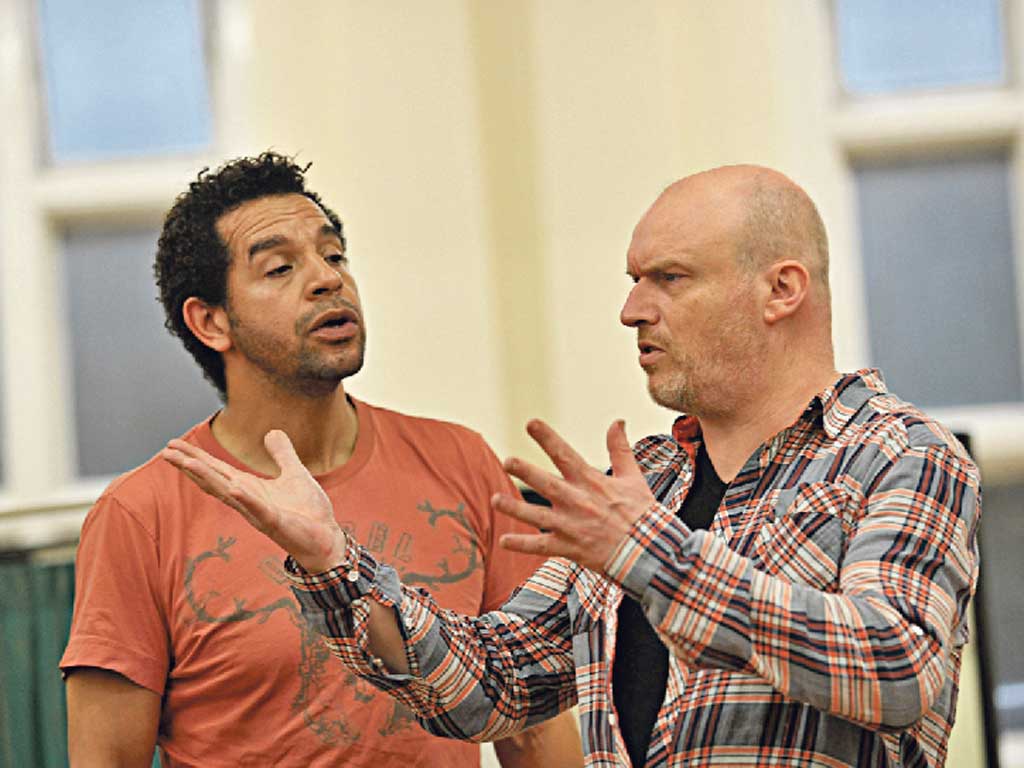Wooster Group and the RSC: Strange bedfellows...
New York experimentalists The Wooster Group are joining forces with the RSC for an unconventional Troilus and Cressida. Matt Trueman drops in on rehearsals

As collaborations go, The Wooster Group and the Royal Shakespeare Company make an unlikely, almost oxymoronic, partnership. Imagine Gary Barlow writing a song with John Cage or an issue of Dazed & Confused as a literary supplement and you're on the right lines.
A Wooster Group show is more likely to feature blackface than blank verse and, as the New York Times once put it, the company "borrows, bends and, in some cases, tries to trash dramatic works of the past." To the best of my knowledge, Arthur Miller has never sent the RSC a cease and desist notice over their handling of The Crucible, as he did the day after seeing the Woosters' potted version in L.S.D. (…Just the High Points…) in 1984. Their only previous attempt at Shakespeare was a recreation of Richard Burton's 1964 Hamlet, in which actors lined up with a projected video recording and lip-synced along.
"I don't usually like theatre and I don't usually like Shakespeare," says the company's director, Elizabeth LeCompte. A moment later, she softens, remembering a Measure for Measure with Mark Rylance. "I like seeing English people do Shakespeare, but I'm not so wild about Americans doing Shakespeare. The English have it. They have it in their very glottal stops."
The current collaboration was director Rupert Goold's suggestion. Charged by the RSC to suggest an international partner, he chose LeCompte, who has led the Wooster Group from its inception in 1975, when it emerged out of Richard Schechner's influential Performance Group. She's watched every performance of every show since.
LeCompte had seen – and, unusually, enjoyed – Goold's Macbeth with Patrick Stewart during its 2008 Broadway run. They hit upon Troilus and Cressida because its warring nations complimented the company's opposing approaches. LeCompte and the Woosters would take the Trojans; Goold and the RSC, the Greeks. (In March, Goold dropped out because of filming commitments and was replaced by the RSC's writer in residence, Mark Ravenhill). Rehearsals would, initially, straddle the Atlantic Ocean, with conferring kept to a minimum.
"At first we didn't think it was possible," explains LeCompte's associate and fellow founder-Wooster Kate Valk. "We thought, 'The RSC? Oh, wow.' They're just so different. Like another species. We work from such different spaces. I've never really seen anything by the RSC, but when you hear The Royal Shakespeare Company…" She slows the last three words into an awestruck drawl and tails off.
"It took us two weeks to read it through once. We were looking everything up and watching movie versions to remind ourselves of the characters, because we'd get so lost in it."
For LeCompte that was the key: "I couldn't imagine doing it and, after 35 years, I look for things that seem impossible." Ravenhill describes the process as "a collision and a collaboration", and says it's refreshing. "I wanted to leave everything open," he says. "Maybe we'd decide on Elizabethan costume and immaculate blank verse or maybe we'd be lying on the floor with 20 cameras pointing at us."
Since the New Yorkers arrived, the separation has continued at the RSC's Clapham rehearsal rooms. Upstairs, the RSC's Greeks are in desert camouflage gear adorned with 80s rock star hairdos. Downstairs, the Wooster Group's Trojans are dressed as Native Americans in DayGlo colours, a concept sparked by their cultural detachment from Shakespeare. The end result will be a mongrel staging, still very much two halves slammed or sellotaped together.
Ravenhill thinks its suits the play perfectly, as it hops from comedy to romance, domestic to epic. "The tone changes from page to page. It's very modern in that way: collagey and kaleidoscopic. The challenge is not to try and iron that out into one consistent tone, but to try and respond to the play as it shifts."
That could explain why the play held particular interest for The Wooster Group. They approach plays moment by moment, rather than seeking a psychologically credible whole. Actors wear headphones and watch television screens around the stage, building the movements they see and sounds they hear into their performance. The clips are harvested from films and found footage and then allocated to moments in rehearsal. For Troilus and Cressida, they've used Westerns and footage of Inuit tribes. The performers are so taken up by this task, they don't have room to think "in character", but character emerges nonetheless.
It's an alien concept for the more naturalistic RSC actors. "Imagine the Welsh when the crossbow was introduced," jokes Valk. "They're curious. Maybe a little bit threatened. As we are by them."
That surprised Ravenhill somewhat: "First of all, I thought they were being a bit ironic, but they are genuinely a bit in awe of English actors' facility with text and Shakespeare."
The rehearsal rooms are very different. The RSC's is surprisingly playful. Downstairs, there's a forensic, churchly atmosphere. LeCompte is always at the centre. Or rather, the centre is always LeCompte. She works on a two-second line for half an hour, honing the segue from Inuit to Shakespeare's text. You sense a production that solidifies like concrete drying in slow motion.
But clashes and unfamiliar approaches are rightly at the heart of the World Shakespeare Festival. Projects like this suggest that Michael Boyd, the RSC's artistic director, has been using it as an opportunity for mischief. Ravenhill agrees: "Whether consciously or unconsciously, Michael's left room for some extra chaos." Maybe there's more common ground between the two companies than you'd imagine.
'Troilus and Cressida', Swan Theatre, Stratford-Upon-Avon (0844 800 1114) 3 to 18 August; Riverside Studios, London W6 (020 8237 1111) 24 August to 8 September
Join our commenting forum
Join thought-provoking conversations, follow other Independent readers and see their replies
Comments
Bookmark popover
Removed from bookmarks